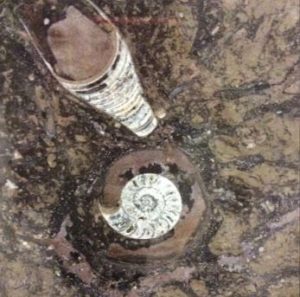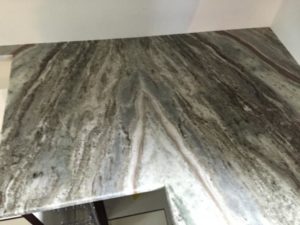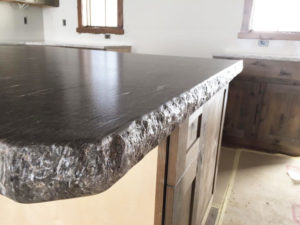Need to choose a countertop?
Having a difficult time deciding?
We can help you with that.
We’ll walk you through the most popular choices available on the market today, informing you of the pros and cons of each type.
By the end of the series you’ll be able to make an informed decision on which one will be best for your application.
We’ll start with the natural stones of granite and marble, then move along to man-made quartz, corian, laminate, concrete, and finally butcher block.
Granite
A higher-end natural product that’s been around for a long time, granite is still popular and in demand. It’s a durable material that resists heat and brings an earthy solid feeling to kitchens and bathrooms.
Attributes of granite countertops
-
It’s a pure and natural stone that’s mined around the world. Granite is actually comprised of many different minerals including feldspar, quartz and mica, and each slab is unique. Look for fossils and unusual patterning or coloring to bring a natural beauty into your home
- Granite is used in about 20% of the kitchens of the supplier that we spoke to
- It’s available in a wide variation of finishes such as leather, brushed, honed (aka suede) and of course, the traditional polished finish. TIP: A honed finish is higher maintenance as it shows marks more easily
- Select slabs quarried from the same stone to ensure color and veining are similar as they can vary greatly. TIP: Due to the wide range of variations you may want to visit a supplier’s yard to personally choose your slabs. Who knows, you may get there and change your mind completely if you happen to come upon a one-of-a-kind piece
- Resistant to scratches and damage from heat (pots or hair styling equipment)
- Outstanding durability and strength
- Look for stone from Canadian quarries in Eastern Canada
Things to know about granite
- Requires some moderate maintenance but that can depend on the stone type and where it’s used
- Be prepared to seal your countertops every 1-2 years
- Resealing granite is easy and affordable. Resin based sealing products resist stains better
- Granite has good stain resistance and is easy to clean when sealed properly
- As it’s porous, improper sealing or failure to reseal when needed can lead to staining
-
Good quality suppliers will seal their finished countertops with a durable finish
- Care for your granite by wiping up stains immediately, refraining from leaving wet items on the countertop, using a cutting board and taking extra care to not drop heavy items on it
- Be aware that corners may chip or break with impact by heavy objects
- It’s susceptible to etching from acidic material such as lemon juice and vinegar
- Seams may be more noticeable if the color or pattern varies greatly at them. Book-matching can reduce the appearance of the seams
Costs
-
Price ranges from $85-$200 per sq ft. TIP: The complexity of the job, number of seams, corners, and the style of the edge profile will impact countertop costs. Much of the cost is in the fabrication of your countertop rather than the material itself
- Standard eased-edge is the stock profile. There are several others to choose from costing around $30-$40 extra per linear foot. You can also get a live-edge look that is great for outdoor bar b q areas or islands
- Consider fluting beside your sink. This is where the fabricator creates channels in the countertop similar to a built-in drain-board
Continued in part 2




